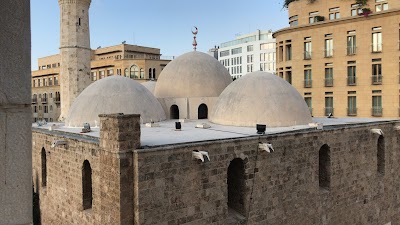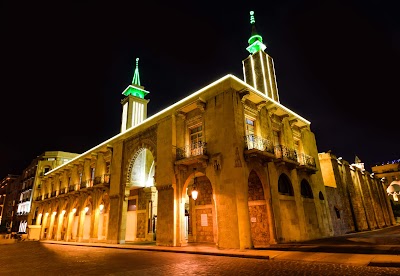Al-Omari Mosque (مسجد العمري الكبير)
Overview
Welcome to the Al-Omari Mosque, a historic gem located in the heart of Beirut, Lebanon. This venerable mosque, with its rich history and captivating architecture, offers a profound glimpse into the region's diverse cultural and religious tapestry. Whether you are a history enthusiast, an architecture buff, or simply a curious traveler, the Al-Omari Mosque promises an engaging journey through time.
The origins of the Al-Omari Mosque date back to the 12th century when it was originally constructed as the Church of Saint John by the Crusaders. Situated in the Central District of Beirut, it exemplifies the intertwining of different cultures and religions over the centuries. Following the Muslim conquest of Beirut in 1291, the Mamluks converted the church into a mosque, naming it Al-Omari in honor of the second caliph, Omar ibn al-Khattab. This transformation marks a significant chapter in the mosque's history, symbolizing the region's shift from Christian to Islamic rule.
One of the most striking features of the Al-Omari Mosque is its remarkable architecture. The building showcases a blend of Romanesque and Islamic architectural styles, reflecting its multifaceted past. The mosque's robust stone walls and grand arches are reminiscent of its original Christian structure, while its elegant minaret and intricate Islamic calligraphy highlight its current identity as a Muslim place of worship. The fusion of these elements creates a unique aesthetic that captivates visitors.
As you enter the mosque, you will be greeted by a serene courtyard, often filled with the delicate fragrance of jasmine. This tranquil space serves as a peaceful retreat from the bustling streets of Beirut. Bordered by elegant arcades, the courtyard provides a shaded walkway adorned with beautiful motifs and inscriptions. This area is a testament to the mosque's enduring role as a place of contemplation and communal gathering.
Inside, the prayer hall is an awe-inspiring sight, spacious and filled with natural light filtering through delicately designed windows. The high, vaulted ceilings create a sense of grandeur, while the exquisite mihrab (prayer niche) and minbar (pulpit) draw attention with their fine craftsmanship. The mihrab, elaborately decorated with geometric patterns and calligraphy, indicates the direction of Mecca, guiding the faithful during prayers. The overall atmosphere inside the mosque is one of reverence and tranquility, inviting visitors to pause and reflect.
The Al-Omari Mosque holds significant cultural and religious importance in Beirut. It stands as a symbol of the city's resilience and adaptability, having survived numerous historical upheavals, including earthquakes and conflicts. Throughout its long history, the mosque has witnessed the evolving landscape of Beirut, serving as a constant spiritual sanctuary for its inhabitants. It continues to play a vital role in the community, hosting daily prayers, religious festivities, and cultural events.
Visitors to the Al-Omari Mosque can also explore the surrounding area, which offers a rich array of attractions. Close by is the vibrant Saifi Village, known for its charming streets, art galleries, and boutique shops. The nearby Beirut Souks provide a modern yet historic shopping experience, with a variety of stores, restaurants, and entertainment options. For those interested in further historical exploration, the Roman Baths and the National Museum of Beirut are just a short distance away, each offering unique insights into the city's past.
Before visiting, it is essential to remember that the Al-Omari Mosque is a functioning place of worship. Modest dress is required, and visitors should be respectful of prayer times and local customs. Guided tours are available, providing valuable insights into the mosque's history and architectural nuances. These tours are an excellent way to deepen your understanding and appreciation of this magnificent site.
In conclusion, the Al-Omari Mosque is more than just a historical monument; it is a living testament to the rich, layered history of Beirut. Its architectural splendor, cultural significance, and spiritual ambiance make it a must-visit destination for anyone journeying through Lebanon. By exploring the Al-Omari Mosque, you not only gain a deeper understanding of the region's past but also experience the harmonious coexistence of diverse traditions that continue to shape Beirut's present and future.






